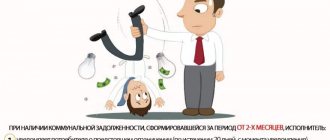What are the consequences of failure to pay for major repairs?
Let's look at what happens if you don't pay into the capital repair fund, and what consequences happen for debtors.
Immediately after the introduction of this payment, many questions arose about the need to pay it and the possible consequences for debtors.
Is the payment for major repairs mandatory or voluntary?
Are homeowners required to pay into the fund for capital repairs of an apartment building? Who is exempt from contributions and why?
And what powers he has. And the fact that you need to pay for major repairs is stated without any misinterpretation in the federal legislation of the Russian Federation, which has not yet lost its force.
Who has the right not to pay? Who is not obliged to pay for major repairs of common property in an apartment building?
There are such “castes” (Federal Law No. 399-FZ of December 29, 2015). Payment for major repairs for homeowners is not mandatory for:
residents of emergency housing (money will be returned if the “extortions” began after the housing was declared unsuitable or dangerous for habitation!); living in housing seized by the state; single citizens who have reached the age of 80.
Penalties for major repairs, and what else threatens non-payment of contributions for major repairs - liability
In most cases, owners of apartments in new buildings have no idea what their payments will be used for and why they need to pay contributions. After all, the house is in fact still new, and repairs will not be needed soon. The fact is that major repairs are not cheap. For this reason, the amount of contributions is divided among all residents on a monthly basis throughout the entire period of operation.
Major repairs involve a certain amount of construction, installation, etc. work performed depending on the current condition of the apartment building. The purpose of carrying out such work is to ensure the functional condition of the apartment building so that residents can live in safety without fear that their house may collapse.
Can they sue for non-payment of capital repairs?
Just like payment for housing and communal services, payment for major repairs is a mandatory procedure.
In addition, the Housing Code talks about the responsibility that falls on homeowners regarding its maintenance and improvement of the local area.
The amount of contributions directly depends on the subject of the Russian Federation. Local authorities approve a fixed amount of payment, guided by the square footage of the housing in which each individual owner lives.
Why is there an opinion among some owners that paying for major repairs is an optional procedure? This is due to the fact that the capital repair fund is considered a voluntary association. Therefore, many residents are convinced that making contributions for major repairs can be carried out on a voluntary and not a forced basis.
What liability is imposed for failure to pay contributions to the capital repair fund of an apartment building? what happens if you don't pay? What are the consequences of refusing to pay for major repairs? (2018)
Which in itself is the basis for paying fees.
The amount of contributions is calculated at the regional level.
Each region determines a fixed tariff amount per square meter of area. Many citizens think that since the fund is a voluntary structure, then contributions for major repairs are also voluntary. This hypothesis is partially true.
Every ruble received into the account is visible on the balance sheet of the company’s official website, and visual reports on work and spending of funds are also presented there. Failure to pay the overhaul fee will result in a penalty.
What could be the consequences of failure to pay for major repairs - court?
There may be few exceptions to stopping or deferring payments:
- Ownership of housing construction by municipal authorities;
- Non-privatized property;
- The decision of the local authority on .
- Emergency condition of the house;
In all other cases, the law obliges apartment owners to pay monthly.
- When the amount of debt exceeds 10 thousand rubles, bailiffs have the right to restrict a citizen’s rights to travel abroad;
- Penalty;
- Additionally, bans may be imposed on the sale of movable and immovable property.
- Sale of rights to claim debt to collection organizations;
- Court decision plus legal fees;
- Debt collection with the help of the enforcement service;
What liability is imposed for failure to pay contributions to the capital repair fund of an apartment building?
What happens if you don't pay? What are the consequences of refusing to pay for major repairs?
After the introduction of mandatory payments for mandatory capital repairs, many people express their protest.
Residents of new houses do not understand where their funds will go, because the house has just been commissioned, and citizens, accustomed to eliminating problems efficiently and at their own expense, also do not want to pay for someone else’s work.
There is a separate category of citizens who directly say: I don’t want and won’t pay. These people simply do not trust their management company or HOA, and therefore do not at all want to pay money for the needs of major repairs.
Tariffs for major repairs vary depending on the city in which you live. The highest prices apply to residents of the capital, slightly less - in regional cities. Not all funds donated for major repairs are spent rationally, and citizens understandably want to protect themselves from deception, so they refuse to pay bills.
Consequences of failure to pay for major repairs
Contents Russian citizens have become required to pay money for major home repairs over the past six years. Some homeowners, having trusted rumors that it was not necessary to make such payments, simply began to evade such obligations.
This led to a lot of conflicts and litigation. It is worthwhile to dwell in more detail on the legality of this issue and understand the consequences of non-payment for major repairs. Disputes surrounding the legality of collecting payments for major repairs have been going on since 2012. That is. exactly from the moment the new Federal Law No. 271 “On Major Repairs” was approved.
In fact, this law is not independent; it only defines a number of amendments to the Housing Code of the Russian Federation. According to the new legislation, all homeowners (with rare exceptions) are required to make certain payments every month towards future repairs of an apartment building.
All amounts of money must be deposited into the Capital Repair Fund account only on the basis of financial documents (payments). The amount deposited depends on the area of residence. It is determined by local authorities.
Those. they decide what amount of payment per 1 sq. m. meter of housing. And for the final calculation, this amount should be multiplied by the size of the apartment area. In large federal cities (for example, Moscow) these amounts are slightly higher than in other populated areas.
If homeowners ignore making payments for major repairs, this automatically entails penalties.
First of all, the accrual of penalties.
Penalties for major repairs, and what else threatens non-payment of contributions for major repairs - liability
In 2012, a new fixed line appeared in all payments - “major repairs”.
Now citizens must pay the required monthly amount established by tariffs, which will go towards repairing their apartment building.
But many citizens do not agree with this state policy; moreover, some refuse to pay the bill for major repairs. Our task is to figure out how legal this is and what will happen if you don’t pay for major repairs of an apartment building. ... Dear readers! Our articles talk about typical ways to resolve legal issues, but each case is unique.
If you want to find out how to solve your particular problem, please contact the online consultant form on the right or call +7. It's fast and! Major repairs are various types and volumes of repair work that are designed to keep the house in acceptable condition, and also guarantee the safety and convenience of its residents.
Even the Civil Code empowers tenants to keep their home in acceptable condition in Article 210.
Article 210. Burden of maintaining property The owner bears the burden of maintaining the property belonging to him, unless otherwise provided by law or contract. However, in practice it is not so simple.
After the introduction of mandatory payments for mandatory capital repairs, many people express their protest.
Residents of new houses do not understand where their funds will go, because the house has just been commissioned, and citizens, accustomed to eliminating problems efficiently and at their own expense, also do not want to pay for someone else’s work.
What are the consequences of failure to pay contributions for major repairs in an apartment building?
With the introduction of the law regarding the mandatory payment of contributions for major repairs, many citizens had a logical question - what will happen if they are not paid?
First of all, it is necessary to identify the circle of persons who are obliged to pay contributions - these are citizens who are owners of residential premises, with the exception of beneficiaries (they will be discussed below). If a person rents an apartment, then, accordingly, there is no need to pay contributions.
What happens if you don't pay for major repairs?
If the required contributions are not paid, the owner of the premises will have to pay a fine to the regional fund - for each day of delay, amounting to 1/300 of the refinancing rate of the Central Bank of Russia. In addition, a claim may be filed with a judicial authority against a person who does not pay the fees, on the basis of which a decision will be made not only on the payment of the fees and fines themselves, but also legal costs. And if a citizen does not pay the debt before the writ of execution is handed over to the bailiffs, then the following may be applied to him:
- ban on traveling abroad;
- arrest and seizure of property;
- arrest of accounts.
This is interesting: Providing additional leave for military personnel
Whether one measure or another will be applied depends on the size of the debt for major repairs, but, as a rule, prohibition and seizure of property are rarely used; the main measure that is used most often is the seizure of accounts of defaulters.
Are there ways to avoid paying for major repairs?
The main way to avoid paying for repairs is deprivatization - i.e. the citizen returns the property back to the state, after which he ceases to be the owner of the property, but the obligation to pay is also removed from him. After deprivatization, the new owner, the state, will pay for the apartment; the citizen will continue to live in the apartment, but he will not be able to perform any actions (sale, donation, etc.) with it.
In addition, citizens whose houses were recognized as unsafe are exempt from the obligation to pay for major repairs, and if the corresponding contributions have already been made, then the funds can be returned back - including those previously paid by another owner.
Benefits for paying for major repairs
The law provides a list of categories of citizens who have benefits for paying for major repairs - these include:
- single pensioners over 70 years of age;
- children with disabilities, as well as their parents;
- Chernobyl victims;
- citizens who are war veterans and their relatives;
- persons who participated in nuclear tests at the Semipalatinsk test site;
- citizens with disabilities of the 1st or 2nd group.
The portal bukva-zakona.com draws your attention to the fact that the above categories of citizens may be exempt from paying for major repairs, either fully or partially. So, if a single pensioner is over 80 years old, then he is completely exempt from paying for major repairs; if not, then he is given a 50% discount. In other cases mentioned above, citizens also have the right to receive a 50% discount.
In the near future, they plan to make changes to the law regarding single pensioners and major repairs - according to them, the discount will be provided not only to persons living alone, but also to citizens with whom minor children and grandchildren live. Until now, such persons have lost the opportunity to receive benefits for major repairs because were considered not alone - at the same time, the presence of children and/or grandchildren did not improve their financial situation, but, on the contrary, worsened it - after all, minors do not have a regular income and a large amount of money is spent on their maintenance. To remove these obstacles, the deputies decided to reconsider this point.
If a person belongs to one of the above categories, he must submit a written application to the regional capital repair fund, attaching documentation confirming the right to benefits and documents for the apartment. If this is not done, the discount will not be assigned because This does not happen automatically, and the citizen will receive receipts with the full cost. If a person has benefits, then he also has the right to apply for recalculation for previous periods - also by submitting an application to the capital repair fund.
Do residents of new buildings need to pay for major repairs?
When considering the issue of payments for major repairs, one cannot help but pay attention to new buildings. Residents of new buildings have the right not to pay for major repairs for 5 years from the date of delivery of the house, after which they, like other citizens, will be required to pay because Over the specified period of time, some communications may wear out and require additional investments:
- foundation;
- roof;
- facade;
- basement;
- drainage;
- energy supply;
- elevator and elevator shaft;
- sewer network;
- gas supply, etc.
If residents of new buildings begin to receive receipts for major repairs earlier than after 5 years, then they have the right to apply to the capital repair fund, attaching documents for the apartment.
How and when to pay
Since September 2014, payment for major repairs has been a mandatory requirement for every owner of residential or non-residential premises in an apartment building. The specified payment must be transferred monthly according to the following rules:
- the basic tariff for paying for major repairs is approved by regional authorities and may differ in different regions of the Russian Federation;
- by a general decision of the residents, the specified tariff can be increased - for carrying out additional types of work during major repairs, for carrying out early repairs, etc.;
- the payment amount is calculated based on the living space per owner - the larger the apartment, the higher the payment amount will be;
- Administration of payments for major repairs is carried out by the regional operator (Capital Repair Fund), or the general meeting of owners (if they voted to open their own savings account).
Although the tariff for major repairs differs among the constituent entities of the Russian Federation, the procedure for applying penalties will be the same. Let's look at what happens if you don't pay into the capital repair fund, and what consequences happen for debtors.
To pay or not to pay?
Contributions to the capital repair fund are mandatory for apartment owners, with the exception of privileged categories of citizens. Periodic non-payment threatens with the introduction of personal sanctions (penalties, fines), legal costs and forced collection of the debt. From this it follows that it is still necessary to pay for major repairs.
Citizens who do not want to hear anything about fundraisers should consider that the organization's activities are legal. Sooner or later, the debt will have to be paid.
Video: What happens if you don’t pay for major repairs?
Consequences of non-payment
Immediately after the introduction of this payment, many questions arose about the need to pay it and the possible consequences for debtors. This was due to the long waiting period for major repairs - regional authorities include every house that requires repairs in the register. The waiting period for repair work can be up to 25 years, during which you need to transfer money monthly to the account of the regional operator.
Currently, failure to pay for major repairs will have the following consequences:
- for each day of delay, a penalty will be charged - 1/300 of the key rate of the Central Bank of the Russian Federation (the specified penalty will be accrued until the debt amount is fully repaid);
- debt to pay for major repairs and penalties can be collected in court, after which they are sent for forced deduction from income or at the expense of property;
- If, at the time of the deadline for major repairs, apartment owners are in arrears on payments, their participation in the program may be suspended for full repayment of debts.
Thus, adverse consequences may threaten not only the debtor himself, but also other residents of the apartment building.
Who will apply these sanctions? If the owners of the premises in the apartment building have not decided to open their own savings account, any demands for debt repayment and penalties will be presented by the regional operator of the Capital Repair Fund. Such funds have been created in each constituent entity of the Russian Federation and are authorized to control the timeliness and correctness of payment of contributions.
If residents have opened their own savings account, they are obliged to take measures to ensure timely payment of contributions. When the scheduled overhaul time comes, residents notify the regional operator about the choice of contractor. If at this moment the funds for repairs have not been fully collected, i.e. there is arrears in contributions, residents will not receive funds from the federal or regional state support program.
To pay for major repairs of apartment buildings or not - practical nuances
The next factor that determines the amount of monthly payment for major repairs is the presence of an elevator in the house. Naturally, residents of high-rise buildings that have a passenger and, in some cases, a freight elevator will have to shell out a larger sum compared to city dwellers who climb the stairs to their apartments every day.
- Roof. The house is often called the roof over your head, thereby emphasizing the importance of this part of the building. Therefore, roof repair work of any complexity is carried out using funds accumulated for major repairs.
- Facade. A people's home should not only be durable and strong, but also beautiful and bright. That is why work aimed at beautifying and updating the facade of the house is also included in the overhaul and is financed from the general account of the residents.
- Foundation. The strength of even the highest mountain depends on the strength of its foundation, and the durability and good performance of a house or any other structure depends on the physical condition of the foundation. This explains the inclusion of all types of foundation repair work in the overhaul.
- Elevator. If for residents of private houses the main parts of the house are only the walls and the roof, then for residents of high-rise buildings, in addition to these most important four sides, there is another important element, more precisely a lifting mechanism. Therefore, its repair, maintenance and, if necessary, replacement are also carried out from funds collected for major repairs.
- Common basement areas. The point where many pipes and other communications are concentrated are the basements; therefore, the “circulatory system” of the house largely depends on maintaining the basement floors in good condition. That is why basement repairs are also carried out during major repairs from the funds of the general house piggy bank.
- In-house engineering systems. Comfortable living of citizens in their apartments is possible only if all engineering systems of the house are working well, that is, water supply, heat pipes and other communications of the house must be in good condition. This explains the maintenance of the house’s engineering systems in full working order using funds allocated for major repairs.
- Installation of common house metering devices. Today in our country all utility bills are paid according to meter readings. In this case, not only apartment meters are taken into account, but also general building meters. To ensure that these meters are in good working order, their installation and maintenance are financed from funds collected for major repairs.
We recommend reading: What is the Maximum Unemployment Benefit in the Irkutsk Region Now?
How sanctions are applied
The obligation to transfer contributions must be fulfilled monthly. Even in a single case of delay, the debtor begins to accrue a penalty. At the same time, a written notice is sent demanding repayment of the debt. If funds for major repairs are not transferred, the regional operator takes the following measures:
- sends to the magistrate's court an application for the issuance of a court order for the entire amount of the debt and interest, or files a statement of claim;
- on the basis of a judicial act, a writ of execution will be received, these documents are sent to the FSSP service to initiate enforcement proceedings;
- forced collection through bailiffs occurs by withholding wages or other types of income (in an amount not exceeding 50% monthly), or at the expense of property assets.
The capital repair program provides benefits for paying a monthly contribution only for limited categories of citizens (for example, for persons over the age of 70 or 80 years, disabled people, etc.). If the debt arose due to incorrect application of the benefit, you must immediately notify the regional operator about this or submit objections to the court.
This is interesting: If you check out of a privatized apartment
The amount of interest will be accrued for the entire period of debt . If the principal debt is collected in court and is not paid by the owners, a claim may be filed for an additional penalty amount. Consequently, the bailiffs may be executing several judicial acts at the same time.
Having received the judicial act and writ of execution, the bailiffs must initiate enforcement proceedings - the resolution will be sent to the debtor by mail. If the amount of debt is relatively small, and the owner is officially employed, the resolution will be sent to his place of work for deduction. Bailiffs can also seize the debtor’s property assets, and if the debt is not paid, sell them at public auction. Suspension of utilities or forced eviction from a residential premises in case of debt for major repairs is not allowed.
If the owners of the house themselves collect monthly payments, they appoint persons responsible for the forced collection of these amounts from debtors. To do this, a written demand is sent, and if it is not fulfilled, a statement of claim is sent to the magistrate or district court. The collected amounts are transferred not to the collector, but to a savings account.
If a statement of claim is sent to the court for the collection of debt and penalties for contributions for major repairs, the debtor may file a petition for a deferment or installment plan. To do this, you need to confirm the validity of the reasons why the debtor cannot fulfill this obligation in a timely manner.
As a rule, the court grants a deferment or installment plan if the debtor cannot find work for a long time and is registered with the employment service, or is undergoing treatment in a medical institution, etc. The judicial act specifies the amount of debt and penalties, as well as the period by which the decision must be executed in full.
Can the court refuse to collect debt and penalties if the apartment building is in unsatisfactory condition? According to the law, citizens living in dilapidated houses that are subject to demolition without restoration are exempt from paying contributions for major repairs. For this purpose, individual legal acts with a list of such objects are adopted at the regional level. The property owners themselves cannot make such a decision - if the house is not included in the specified exclusive list, contributions are paid on a general basis.
Can they sue for non-payment of capital repairs?
Making contributions for major home repairs is a legally approved mandatory procedure that homeowners in an apartment building must regularly perform. Despite this, many residents are convinced that they can avoid paying for major repairs, and legally.
In this article we will answer the following questions: what law regulates the obligation to pay contributions for major repairs? what could be the consequences of their non-payment? Can the capital repair fund sue willful defaulters? Is it possible to avoid having to pay for major repairs legally? Find answers to these and other questions in this article.
Necessary aspects
In accordance with current legislation, every citizen who lives in an apartment building is obliged to pay utility bills on time.
In addition, if this is not provided by the management organization, fees for major repairs of an apartment building are paid separately.
This is an integral part of the life of citizens who live in apartment buildings. However, in some cases, citizens do not have enough available funds for the mandatory payment for major repairs of the building; in this case, the statute of limitations begins to count.
The time period when the management company has the right to go to court to force the collection of a fee for major repairs of residential space that is in general use.
Main concepts
Before considering what the statute of limitations for major repairs is, you should consider a number of concepts that are closely related to this point:
| Major renovation | Providing the building of an apartment building, namely individual common areas, with complete restructuring at the expense of a special fund |
| Contributions for major repairs | Mandatory amounts of funds collected by the management organization from residents of an apartment building for the purpose of subsequent repair work |
| Own | A certain form of property that is in the temporary or permanent possession of a citizen, which is confirmed by the presence of documents |
| Management Company | An organization that provides maintenance to an apartment building, ensures its maintenance before the state, and also, if necessary, carries out repair work |
| Limitation of actions | The time period when a civil procedural case can be opened against a citizen for the purpose of forced collection of debt on contributions for major repairs |
| Courts | Government apparatus responsible to the population for resolving controversial situations, and also authorized to call for accountability for offenses committed |
Taking into account these concepts, it will be much easier to consider the statute of limitations for major repairs of buildings, as well as the mandatory contribution of funds for these actions.
Basic conditions for going to court
It is worth noting that in this case, both the management company against the defaulter, and the residents of the apartment building or representatives of another situation can apply to the court.
Let's consider the main conditions for going to court:
- the citizen does not pay mandatory contributions for major repairs;
- the management organization does not fulfill its immediate responsibilities;
- the management organization ignores the demands of residents;
- the management company does not carry out scheduled repairs;
- The management organization does not carry out major repairs for a long time.
In this case, we are primarily talking about companies that, having collected the funds necessary for repairs, do not fulfill their obligations, which is why citizens have controversial and conflict situations.
Legal basis
Regulation of the issue of establishing a statute of limitations for housing disputes regarding the inaction of the management company or non-payment of citizens' funds for major repairs is based on the following regulatory legal acts:
- Resolution of the Plenum of the Supreme Court of the Russian Federation dated December 11, 2012 No. 29 “On the application of civil procedural legislation by courts”;
- regulatory legal acts regulating the activities of courts in Russia;
- Housing Code of the Russian Federation, article No. 169;
- Civil Procedure Code of the Russian Federation, Article No. 196.
Based on these documents, a statute of limitations is established when the case can be brought to trial against a citizen or management organization.
What law regulates the obligation to pay?
The procedure for making contributions for major repairs is regulated by the norms of the Housing Code of the Russian Federation. Just like payment for housing and communal services, payment for major repairs is a mandatory procedure.
In addition, the Housing Code talks about the responsibility that falls on homeowners regarding its maintenance and improvement of the local area.
The amount of contributions directly depends on the subject of the Russian Federation. Local authorities approve a fixed amount of payment, guided by the square footage of the housing in which each individual owner lives.
Why is there an opinion among some owners that paying for major repairs is an optional procedure? This is due to the fact that the capital repair fund is considered a voluntary association. Therefore, many residents are convinced that making contributions for major repairs can be carried out on a voluntary and not a forced basis. However, the Housing Code refutes this version.
By paying a fee for major repairs, the owners of an apartment building receive the right to control the collected funds and spend them on specific tasks (land improvement, etc.).
Judicial practice in 2020 on contributions for major repairs: to pay or not?
»
Since 2014, in some regions of our country, apartment owners located in apartment buildings began to receive receipts for payment for major repairs.
This raised many questions among the population. Moreover, some of them are still relevant today.
People don't understand what justification there is for such expenses.
Owners of Moscow apartments also joined the residents of the regions. Increasingly, we receive questions on the portal about the relationship between the contribution rate and legislative provisions, whether it is possible to challenge payments and the debt on them through the court, etc.
In this article we will try to understand what contributions for major repairs are: to pay or not and judicial practice in 2020. If you have any questions, both on the topic of the article and on others, please contact the portal’s specialists for a free consultation. Legal assistance is provided 24 hours a day.
In order for the reader not to study the housing legislation of Russia, we suggest that you familiarize yourself with the main aspects of paying for major repairs of apartment buildings: Contributions are mandatory for payment. The amount of payment in the receipt for major repairs is generated for a specific region in a separate manner. For example, in 15, the capital’s tariffs for mandatory contributions were 15 rubles/m²; for St. Petersburg - 2.5 rubles, and for the Tyumen region - 20 rubles.
To calculate how much
What could be the consequences of non-payment?
- Failure to pay for major repairs will result in penalties for the owner, namely the accrual of penalties . You can see the fine by receiving a receipt from the housing and communal services department. The accrual of penalties, as a rule, begins six months after the owner fails to pay for repairs.
INFO! The size of the fine and the period after which it begins to accrue differ in each subject of the Russian Federation and are established by local authorities.
- In addition to a fine, for persistent defaulters of major repairs, ignoring this obligation may result in a claim from the fund . According to the Law, the owner can file a counterclaim to challenge the fund's claim. However, as practice shows, in the overwhelming majority of cases, the tenant fails to defend his opinion and the fund collects from him the full amount of debt under the Kyrgyz Republic.
- If after this the owner continues to ignore the obligation to pay for major repairs and the resulting debt, the next penalty will be the seizure of personal property (to repay the debt) or blocking of a bank account . In this case, the debtor will have to pay not only the debt for major repairs, but also the services of a legal specialist to protect his interests in court.
- An owner with a debt for major repairs may have difficulties selling an apartment . When receiving certificates from the housing and communal services department, its employees may refuse the tenant, citing the need to repay the debt under the Kyrgyz Republic (for legitimate reasons). A potential buyer of an apartment will also require the buyer to provide documents confirming the absence of any encumbrances on the acquired real estate, in particular the existing debt for major repairs;
- Imposing a ban on leaving the country . A similar measure can be applied if the amount of debt for major repairs exceeds ten thousand rubles;
- Eviction from the apartment. This is quite an extreme measure, which can only be applied if the amount of debt incurred for major repairs amounts to the market value of the property. The fund can achieve the eviction of a persistent defaulter only in court by filing an appropriate claim. First, the home is put up for sale, after which the amount of debt, legal costs, penalties, etc. are added. If after paying off all the above items there is some amount of money left, it is not transferred to the account of the former owner of the apartment.
Is it possible to avoid paying legally?
In accordance with current legislation, some categories of citizens are exempt from the need to pay bills for major repairs. These include:
- WWII veterans;
- honorary citizens of the region and country;
- owners of emergency housing (officially recognized);
- owners of primary housing;
- citizens who have passed the eighty year mark;
- residents of non-privatized housing;
- other categories of citizens approved by local authorities.






